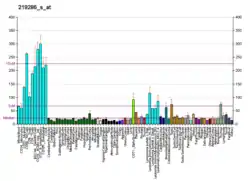RBM15
Putative RNA-binding protein 15 is a protein that in humans is encoded by the RBM15 gene.[4][5][6] It is a RNA-binding protein that acts as a key regulator of N6-Methyladenosine (m6A) methylation of RNAs[7]
References
- GRCh38: Ensembl release 89: ENSG00000162775 - Ensembl, May 2017
- "Human PubMed Reference:". National Center for Biotechnology Information, U.S. National Library of Medicine.
- "Mouse PubMed Reference:". National Center for Biotechnology Information, U.S. National Library of Medicine.
- Ma Z, Morris SW, Valentine V, Li M, Herbrick JA, Cui X, Bouman D, Li Y, Mehta PK, Nizetic D, Kaneko Y, Chan GC, Chan LC, Squire J, Scherer SW, Hitzler JK (Jun 2001). "Fusion of two novel genes, RBM15 and MKL1, in the t(1;22)(p13;q13) of acute megakaryoblastic leukemia". Nat Genet. 28 (3): 220–1. doi:10.1038/90054. PMID 11431691. S2CID 36236342.
- Mercher T, Coniat MB, Monni R, Mauchauffe M, Nguyen Khac F, Gressin L, Mugneret F, Leblanc T, Dastugue N, Berger R, Bernard OA (May 2001). "Involvement of a human gene related to the Drosophila spen gene in the recurrent t(1;22) translocation of acute megakaryocytic leukemia". Proc Natl Acad Sci U S A. 98 (10): 5776–9. Bibcode:2001PNAS...98.5776M. doi:10.1073/pnas.101001498. PMC 33289. PMID 11344311.
- "Entrez Gene: RBM15 RNA binding motif protein 15".
- "UniProtKB - Q96T37 (RBM15_HUMAN)". Retrieved 29 October 2018.
Further reading
- Strausberg RL, Feingold EA, Grouse LH, et al. (2003). "Generation and initial analysis of more than 15,000 full-length human and mouse cDNA sequences". Proc. Natl. Acad. Sci. U.S.A. 99 (26): 16899–903. doi:10.1073/pnas.242603899. PMC 139241. PMID 12477932.
- Ota T, Suzuki Y, Nishikawa T, et al. (2004). "Complete sequencing and characterization of 21,243 full-length human cDNAs". Nat. Genet. 36 (1): 40–5. doi:10.1038/ng1285. PMID 14702039.
- Beausoleil SA, Jedrychowski M, Schwartz D, et al. (2004). "Large-scale characterization of HeLa cell nuclear phosphoproteins". Proc. Natl. Acad. Sci. U.S.A. 101 (33): 12130–5. Bibcode:2004PNAS..10112130B. doi:10.1073/pnas.0404720101. PMC 514446. PMID 15302935.
- Gerhard DS, Wagner L, Feingold EA, et al. (2004). "The status, quality, and expansion of the NIH full-length cDNA project: the Mammalian Gene Collection (MGC)". Genome Res. 14 (10B): 2121–7. doi:10.1101/gr.2596504. PMC 528928. PMID 15489334.
- Hsiao HH, Yang MY, Liu YC, et al. (2005). "RBM15-MKL1 (OTT-MAL) fusion transcript in an adult acute myeloid leukemia patient". Am. J. Hematol. 79 (1): 43–5. doi:10.1002/ajh.20298. PMID 15849773. S2CID 30859557.
- Gregory SG, Barlow KF, McLay KE, et al. (2006). "The DNA sequence and biological annotation of human chromosome 1". Nature. 441 (7091): 315–21. Bibcode:2006Natur.441..315G. doi:10.1038/nature04727. PMID 16710414.
- Beausoleil SA, Villén J, Gerber SA, et al. (2006). "A probability-based approach for high-throughput protein phosphorylation analysis and site localization". Nat. Biotechnol. 24 (10): 1285–92. doi:10.1038/nbt1240. PMID 16964243. S2CID 14294292.
- Lindtner S, Zolotukhin AS, Uranishi H, et al. (2007). "RNA-binding motif protein 15 binds to the RNA transport element RTE and provides a direct link to the NXF1 export pathway". J. Biol. Chem. 281 (48): 36915–28. doi:10.1074/jbc.M608745200. PMID 17001072.
- Olsen JV, Blagoev B, Gnad F, et al. (2006). "Global, in vivo, and site-specific phosphorylation dynamics in signaling networks". Cell. 127 (3): 635–48. doi:10.1016/j.cell.2006.09.026. PMID 17081983. S2CID 7827573.
This article is issued from Wikipedia. The text is licensed under Creative Commons - Attribution - Sharealike. Additional terms may apply for the media files.


